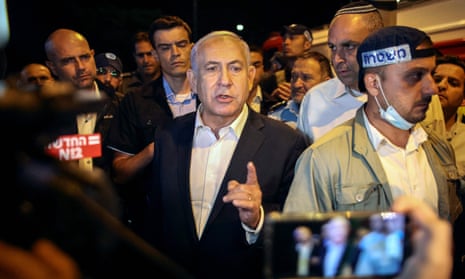The escalating conflict between Israel and Gaza has put efforts to form a coalition government that excludes Israel’s longest-serving prime minister on the back burner.
Until violence erupted this week, Benjamin Netanyahu appeared to be on the verge of losing his position at the helm of Israeli politics after 12 years as prime minister.
The country’s fourth inconclusive general election in the past two years had led to the opposition leader, Yair Lapid, being asked to try to put together a coalition. But the flow of rockets and missiles between Israel and Gaza, plus intercommunal violence within Israel itself, has complicated those efforts.
Lapid has a deadline of 2 June to form a workable coalition, although that timeframe is likely to be in doubt should the current hostilities continue. Meanwhile, Netanyahu is seeking to reinforce his reputation as a strong leader willing to stand up to Palestinian militants with uncompromising rhetoric about inflicting mortal blows on Hamas and “iron fists”.
Alluding to his own “united, strong and forceful leadership”, Netanyahu said on Wednesday: “We are working with all our might to protect Israel from enemies outside and rioters within.”
Although Netanyahu has presided over two previous military operations in Gaza in 2012 and 2014, this time there is a significant difference.
One of his successes over the past 12 years has been largely to detach the Palestinian issue from the day-to-day lives of most Israelis. The occupation of the West Bank, East Jerusalem and Gaza has not been a significant factor in recent elections. Apart from clashes across the Gaza border, violence has been confined mainly to flashpoints in the occupied West Bank.
But the eruption this week of riots and violent attacks between Jewish and Arab citizens of Israel in towns in which there had been a degree of coexistence has brought the issue close to home.
Lapid said there had been a “complete loss of control” and accused Netanyahu of “leading us to anarchy”. He added: “Jewish and Arab rioters have declared war on Israel, and there’s no response, no government, no police, no leadership.”
Writing in Yedioth Ahronoth, Israel’s biggest-circulation newspaper, the commentator Nadav Eyal said: “We are seeing dissolution; we are seeing the fracturing of our social compact.”
Louis Fishman, an associate professor at Brooklyn College, wrote in Haaretz that Netanyahu’s “greatest magic trick” had been to blind Israeli Jews to their state’s oppression of the Palestinians. “But even the most carefully constructed house of cards eventually starts tumbling down, and that exactly is what is happening now … Impregnable Netanyahuism, the work of a master illusionist, is shattering.”
Lapid said the events of the past week were “no excuse” for keeping Netanyahu in place. “Quite the opposite. They are exactly the reason why he should be replaced as soon as possible.”
But that will not be an easy task. The small parties across the political spectrum that are Lapid’s potential partners are likely to struggle to put aside their differences. Lapid, a former television journalist, lacks heavyweight political and military experience in the context of a major conflict.
On top of the political threat to his premiership and current criticism over the mayhem in mixed Israeli towns, Netanyahu is also the first serving Israeli prime minister to stand trial on criminal charges, including fraud and bribery. He denies the charges, saying he is the victim of a politically motivated witch-hunt.
The wheels of Israeli justice turn slowly, but the prospect of a conviction and jail sentence at some point in the future must be part of the complex calculations over his survival.
For the moment, however, the current conflict provides some protection. “Netanyahu is exactly where he wants to be, in the middle of a major crisis, where you don’t want to change the prime minister,” Mitchell Barak, a political analyst based in Jerusalem, told the New York Times. “Everything’s wide open.”









